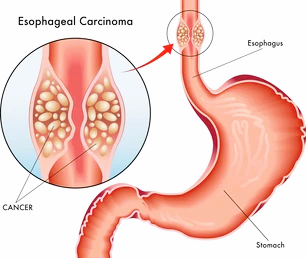Esophageal Cancer: Causes, Symptoms, and Treatment.
Discover the causes, symptoms, and treatment options for esophageal cancer. Stay informed and learn how to manage this condition effectively. Read more on Esophageal Cancer here.


Esophageal cancer is a malignant tumor that develops in the lining of the esophagus, the muscular tube that connects the throat to the stomach. It is a relatively rare form of cancer, but its incidence has been increasing in recent years. Understanding the symptoms, causes and treatment options for esophageal cancer is crucial for early detection.
Causes of Esophageal Cancer
There are several factors that can increase the risk of developing esophageal cancer:
Tobacco and alcohol: Smoking and heavy alcohol consumption are two of the most significant risk factors for esophageal cancer.
Chronic acid reflux: Long-term gastroesophageal reflux disease (GERD) can lead to a condition called Barrett's esophagus, which increases the risk of esophageal cancer.
Dietary factors: A diet low in fruits and vegetables and high in processed foods and red meat may contribute to an increased risk of esophageal cancer.
Obesity: Being overweight or obese increases the risk of developing esophageal cancer.
Age and gender: Esophageal cancer is more common in older individuals, and men are more likely to develop it than women.
Symptoms of Esophageal Cancer
The early stages of esophageal cancer may not cause noticeable symptoms. However, as the tumor grows, the following symptoms may occur:
Dysphagia: Difficulty swallowing, often starting with solid foods and progressing to liquids.
Unintentional weight loss: Significant and unexplained weight loss can be a sign of esophageal cancer.
Chest pain or discomfort: Persistent pain or discomfort in the chest, particularly behind the breastbone.
Chronic cough: A persistent cough that does not go away may be a symptom of esophageal cancer.
Hoarseness: Changes in the voice, such as hoarseness or difficulty speaking, can occur.
Treatment of Esophageal Cancer
The treatment of esophageal cancer depends on the stage of the disease and the overall health of the patient. The main treatment options include:
Surgery: Surgical removal of the tumor and surrounding tissues is often the primary treatment for early-stage esophageal cancer.
Radiation therapy: High-energy X-rays or other forms of radiation are used to kill cancer cells and shrink tumors.
Chemotherapy: Powerful drugs are used to destroy cancer cells throughout the body, either before surgery to shrink tumors or after surgery to kill remaining cancer cells.
Immunotherapy: This treatment uses the body's immune system to fight cancer cells.
It is important to note that the treatment plan for esophageal cancer is personalized for each patient and may involve a combination of these treatment options.
In conclusion, esophageal cancer is a serious condition that requires early detection and prompt treatment. Understanding the causes, recognizing the symptoms, and seeking medical attention can significantly improve the chances of successful management and recovery.
